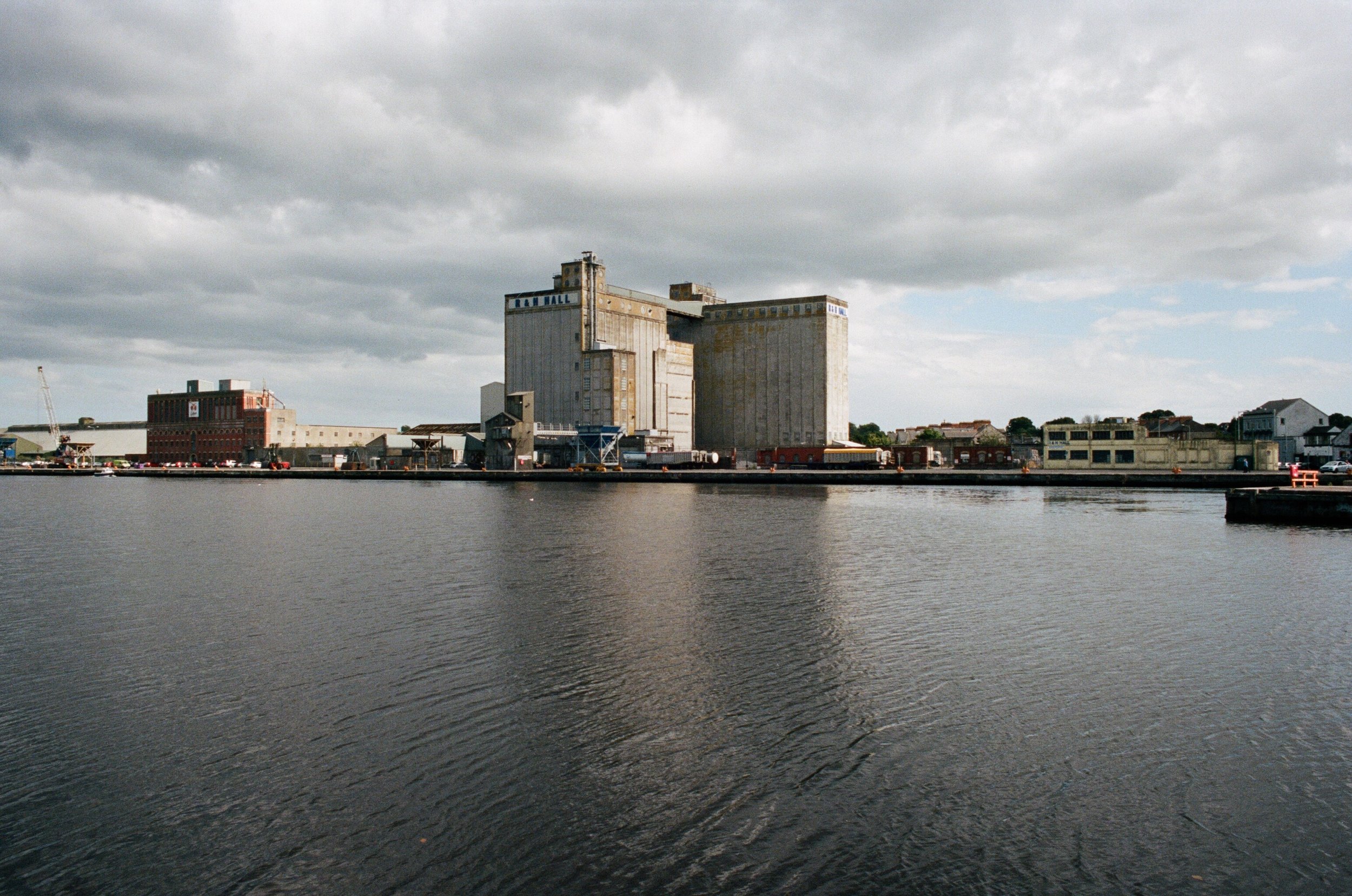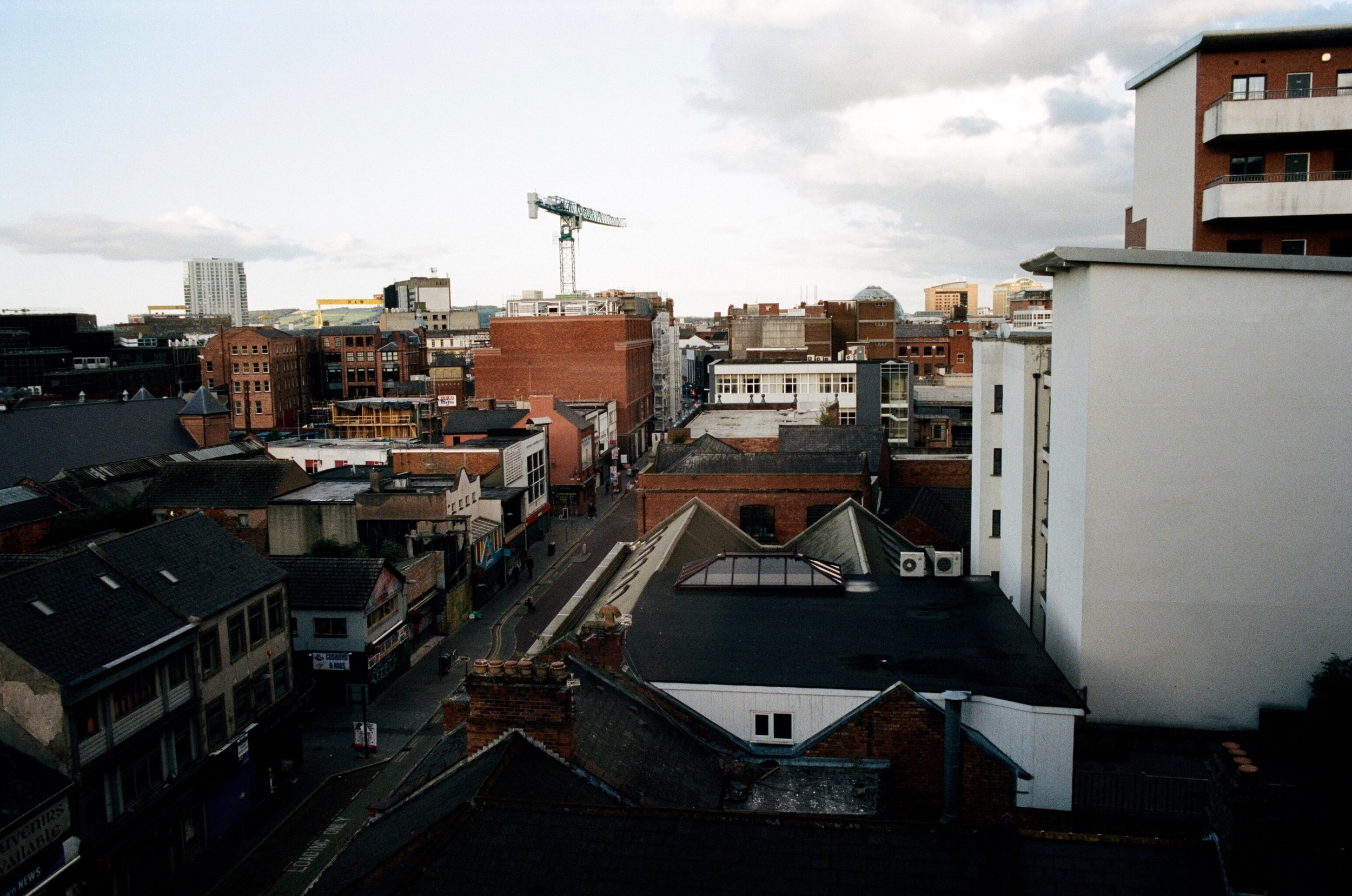Cork – Dublin - Belfast
All knowledge today is comparative knowledge.
Paul Valéry, The Outlook for Intelligence 1935
It was mild and bright when I climbed the steps to the top deck, as the ferry manoeuvred through the channel between the seaport town Cobh and Haulbowline Island. The evening before I’d gone to bed early and despite being woken around five by a child’s cry as the ship rolled across the Celtic Sea, that morning I felt restored. I walked amongst the other passengers viewing the scenery there, mostly holidaymakers and families, before asking a couple nearby if I could take their photograph. Paddy and his wife lived in Berkshire and were travelling to Cork to visit relatives. While the boat docked, Paddy told me why the Irish aren’t like the English.
‘We like to talk,’ he had said. ‘About politics, religion, sex, well not so much sex.’ He’d corrected himself amused. ‘Ireland has changed inconceivably. It’s more progressive, more liberal, in some ways than the UK now. Who would have thought 40 years ago Ireland would have legalised same-sex marriage or voted for abortion. We’re going to visit a cousin of mine, a priest, and I’m looking forward to discussing with him the referendum result on the 36th Amendment.’
A few years before, Paddy had cycled the Wild Atlantic Way and so was interested in my route. I told him I would be setting off from Belfast and planned to cycle to Derry/Londonderry avoiding the coast road, which would be busy with tourist traffic that time of year. After, I thought I would cycle west through Donegal where on reaching the coast I would turn back towards Dublin following the border. Paddy said the road north out of Belfast was dangerous and offered to send some information about cycle routes. He also warned me to be careful of dogs. A few days later I received an email from him, with a link to the website he had recommended and the generous offer that if I needed help while in Northern Ireland, to give him a call.
*
The following morning I caught the train to Dublin. It was another breezy summer’s day and as the train headed north towards Mallow, we passed fields still green despite the long heat wave, interrupted by the occasional spruce forest. Two ladies sitting opposite, a mother and daughter were on their way to Dublin to watch a musical. They said they did not know much, when I asked about Brexit. The older of the two women explaining she wasn’t political. But later she recalled how the border had been before and said she didn’t think it would happen again. She wondered if Brexit would even happen and asked if I thought there would be another referendum.
I did not know. Then, like now, no one had a sense of what was happening. Over the summer the coverage in the press had been scant and mainly focussed on the alleged anti-Semitism in the Labour party. I told them, if there was another vote, or a general election, those supporting Leave and Remain would need to make a considerable effort to better inform the public of the pros and cons of the EU. I also speculated that all the while Nigel Farage, Boris Johnson and the other Brexiteers pinned their personal ambitions to the delivery of Brexit there would be little progress.
‘What do you think of Theresa May?’ the older woman had asked. ‘She seems a hard, unmoveable character to me, a bit like Margret Thatcher. You have to wonder why she took it on.’
I said I felt sorry for her, which was true then. The two women fell silent. The train passed Tipperary, Thurles and Portlasoise.
Some time later, the older woman told me she’d seen the Queen when she visited Cork several years before.
‘She’s doing well for her age.’ She had said. ‘Do you think Megan will stay with Harry? We all watched the wedding. I think they will go to America.’
‘I think she might get bored.’ The daughter added.
‘The royal family are so staid and quiet.’ The two women agreed laughing.
At Kildare the compartment became busier. The horseshow was on in Dublin that week. From the window I saw glimpses of hills and tall static clouds. Before leaving, as part of my research, I had watched the play ‘The Ferryman’. I was particularly moved by the final scenes, which skilfully showed how disenfranchised young men might be seduced by violent causes. The play was praised by most critics and has since moved to New York, but during the interval I had read Sean O’Hagan’s opinion piece in the Guardian, criticising the reproduction of Irish clichés and stereotypes – ‘the relentless drinking, the references to fairies, the Irish dancing, the dodgy priest, the spinster aunts.’ As the train travelled north, I thought then of the dangers of generalising or typecasting and felt the weight of responsibility of attempting to understand (in just two short weeks) the complexity of the situation in both Northern Ireland and Ireland.
In Dublin I exited the station, pushing the bike and gear past the bus transporting those heading to the horse show. I crossed the tram tracks and after the River Liffey near to where the Guinness factory stands. I cycled amongst the traffic only briefly before deciding I’d prefer to walk. Along the riverbank, drunks slept in the sunshine while tourists promenaded past. I stopped at the Ha’penny Bridge, noting the rainbow flags flying from the buildings, then headed north and walked the short distance to Connelly station.
*
The clouds were beginning to gather as we left Dublin. After passing Drogheda I walked through the swaying carriages to the buffet car. At the counter I asked for a bottle of water and a chocolate bar. The man there enquired about my destination, and when I told him Belfast he charged me in pounds although we had not yet crossed the border.
It was late afternoon when we arrived and it had started to rain. I pushed the bike through a series of road works, passing red brick modern buildings before looking up somewhere to stay and choosing the Ibis on Castle Street. In the lobby a coach of tourists on a Game of Thrones tour had just arrived. After unloading my gear, I walked to McGarvey’s bicycle shop looking to buy a poncho to protect me from the rain. The man there was welcoming but didn’t have what I was looking for and so sent me to McCann’s army surplus store in the Smithfield market. There the green, waxed jackets were too heavy, but as I was leaving the owner enquired where I was from and I asked if he could recommend a pub nearby.
‘There’s Madden’s’ he had said, which I’d passed on my way there. ‘You wouldn’t have been able to go in there twenty years ago, but you’ll be all right now.’ He had said. ‘The Sunflower is also good, and there’s music there too,’ he added before giving me directions.
On my way back I passed the West Belfast Taxi rank advertising tours of the city. I passed the hotel heading south and wondered around the streets for a while. By then I was hungry and eventually chose one of the stylish looking restaurants near Wellington Street. Inside I was shown to a table opposite an American family. I ordered a glass of wine and took out my notebook. The manager saw me writing he asked what I was doing. When I explained I was carrying out research on Europe and Brexit he had said.
‘It’s fucking sad. The Brexiters can piss off. You know I was thinking about it this morning. It’s like when a couple splits up. When the father gets bored and wants his independence back. Europe is like the mother. Excuse me being crude, but Europe is like the mother with huge breasts, filled with milk, and the children are being dragged away.’



